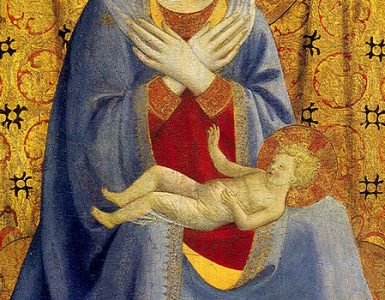Loving Mary as my spiritual mother hasn’t always come easily for me. In fact, one of my earliest memories of learning about Mary in elementary school left me feeling conflicted, sad, and uncertain. I came home from my first grade class at the Catholic school I attended, holding a beautiful holy card with the image of the Immaculate Conception on it. I knew who Mary was – the Mother of God – and I knew why she was important – because she said yes to God in bearing His Son, Jesus.
I just didn’t know how to love her, because I couldn’t relate to her.
Recently, I read about the concept of a “mother wound.” Essentially, this is a term coined for broken relationships with our primary caregivers during our formative years (ages birth through five years). It’s no surprise that many women carry a strained relationship with their biological mothers and mothers-in-law. I always wondered why that was. Now I know a bit more.
Two aspects of womanhood – to give and be a helpmate – translate as maternal protection, nurturance, and service when a woman becomes a mom. But mothers bring their own wounds into their relationships with their children, mostly intentionally but sometimes willfully. The mother wound can be anything as subtle (but still very painful) as being left behind at the grocery store and feeling abandoned, or as horrific as being physically, sexually, or verbally abused or severely neglected as a child.
The wounds translate into a feeling of unworthiness, a sense that we are only as good as what we do (rather than who we inherently are), and that we must perform and be responsible for the happiness and wellbeing of family members (or anyone we love).
At the time of my first grade introduction to Mary, I didn’t have the language to understand why she felt so distant to me. I was supposed to learn the Hail Mary and pray it to her every day, but this felt forced and difficult at first. I understood enough to know that something was awry about this, but it was unclear to me how to amend it. So, I simply recited the Hail Mary dutifully to my teacher and when others prayed the Rosary. Otherwise, the holy card collected dust on the floor of my bedroom closet.
I’ve been a mother for nearly twelve years now. Only in the last several months have I made the connection between the mother wound and my personal relationship with Mary. It occurred to me that perhaps many people also struggle with this. I know that Mary is a sore subject for many Protestants or potential converts to Catholicism. They might object to praying to her, claiming that we only speak directly to God.
The confusion about Mary’s role in our lives – her personal role, her investment in our lives, her intimate love for us – keeps her at arm’s length for Protestants and Catholics alike. If it’s true that we project our relationship with our biological fathers onto our relationship with God the Father, then it could also be true that any deep-seated wounds we hold from our relationship with our mothers might also interfere with our ability to forge a trusting, childlike love for Mary as our spiritual mother.
I revisited the idea of loving Mary and keeping her close to me once I became a mom in my early thirties. Until that time, I respected Mary and adhered to the dogmas about her, but beyond that, I was stuck. And I knew it. Then, when I struggled with chronic sleep deprivation and the postpartum depression that followed, I turned to her in desperation on one terribly lonely night feeding of my daughter, Felicity.
“Mary, please help me,” I sobbed, as Felicity nursed. “I don’t know how to be a mother. Please be a mother to me.” I didn’t realize it then, but this is a variation of the simple prayer recommended by St. Teresa of Calcutta: “Mary, please be a mother to me now.” Truly, this one plea opened the floodgates of Mary’s heart. I felt it in that moment. It was that palpable. One minute I was teetering on the edge of despair, the next I was immersed in a holy peace.
Loving Mary as my spiritual mother has also helped me heal my relationship with all the maternal figures in my life, gradually over time. Women are complex in their emotional expressions (or repressions) of love, so much remains unspoken between mother and daughter. As I meditated on the Seven Sorrows of Mary, I began to see my own mother’s woundedness, and instead of blaming her for what she could not be for me, I felt empathy.
Praying to Mary changes hearts. She changes lives. I can attest to the power of her intercession, but more than that, to her influence and tenderness in the way she cares for me and my children. Now, I am able to turn to her in total confidence when I worry about my kids and say, “Mary, I entrust my children to you. Please be a mother to them in ways I fail, and when I cannot be where they are.”
Despite what we may believe, healing is possible when we begin to turn to Mary with our delights and troubles alike. In fact, healing of the impossible becomes a reality.
✠












